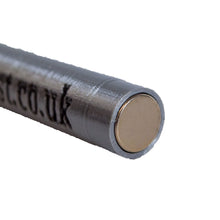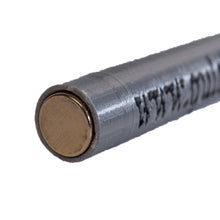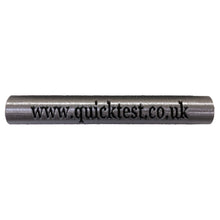Summary
Material: neodymium
A 'rod' 100mm long X 15mm diameter, neodymium magnet both ends, nice to hold, easy to 'sweep' around dishes containing dozens of small items of scrap (to pull some of the non-gold/silver).
Uses for testing
Gold and silver are not magnetic. So when you are presented with dozens of items to test, save time by picking out all the items that are magnetic.
This does NOT mean that there are special magnets for testing gold and silver. If an item is NOT magnetic, it could be...anything (including gold and silver).
Silver is not magnetic, but silver is strongly diamagnetic. If you slide an appropriate magnet down a flat silver surface (e.g. a coin) it will move slowly instead of 'falling off'. Copper is slightly diamagnetic. See our magnets for silver testing.
Copper is not magnetic, neither is brass (a mixture of copper and zinc) or bronze (a mixture of copper and tin). A magnet is useful because many copper / bronze / brass items are really steel that has been plated and will (in most cases) be magnetic. So if an item is magnetic it cannot be solid copper / bronze / brass. Being magnetic does not prove it's steel, not all steel is magnetic.
Samples
Not sure which magnet to buy? We have a bargain sample pack of nine different magnets (both iron and neodymium).
QUESTIONS & ANSWERS
Have a Question?
Be the first to ask a question about this.







